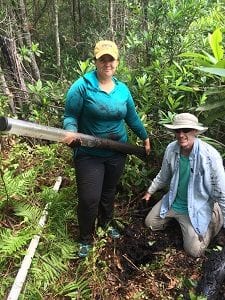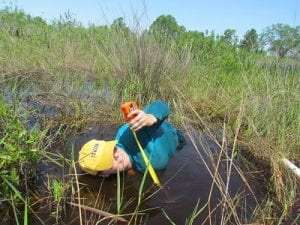A Wild Summer for Biology Research Team

Alicia Huber (left) in the field working with her adviser, Dr. Patrick Bohlen (right).
Alicia Huber, graduate student in the UCF Biology Department, has been working with a team of UCF students this summer at the Disney Wilderness Preserve to investigate its soil’s carbon storage.
“It is well known that wetland ecosystems generally function as carbon sinks—their soils especially often store significant amounts of carbon,” explained Huber. “Although we know that carbon storage varies among wetlands, little is still known about specific drivers of variation.” 
Huber, a student in the Urban Ecology Lab, is working under the guidance of Patrick Bohlen, Ph.D., director of UCF Arboretum & Landscape and Natural Resources.
Her field work at the Disney Wilderness Preserve is research conducted for her master’s thesis project titled, “Hydrologic Regime and Soil Carbon Storage in Restored Subtropical Wetlands.”
Wetland ecosystems store a disproportionately large amount of carbon for their coverage compared to other ecosystems. Huber’s study looks at hydrology’s relationship to soil carbon storage in wetlands in hopes of creating a model that could be used to inform future decisions about wetland management.
The study’s site is the Disney Wilderness Preserve located near Kissimmee, FL, which was once a working cattle ranch. The site was purchased by the Walt Disney Corporation in the 1990’s as part of mitigation agreements to restore the upland and wetland habitats as well as monitor endangered plants and wildlife.
“Because of the scope of this restoration project, there are decades of hydrologic data available for the site,” said Huber. “This does not exist at other sites. Without this available water elevation data throughout Disney Wilderness Preserve, my study would not be possible.”
UCF Arboretum Leadership and Program Facilitator, John Guziejka, as well as undergraduate students Gina Barrella, Shelby Turner, and Paul Boudreau have been heavily involved in the field collection with Huber this summer. They plan to continue their fieldwork into the fall.
